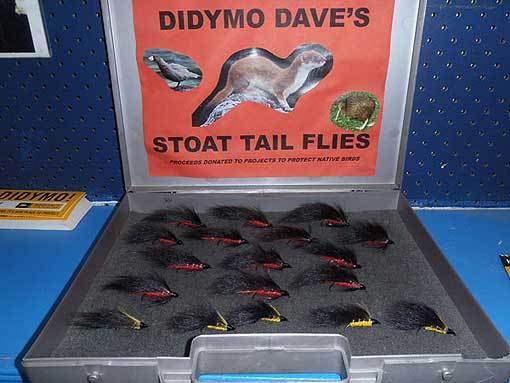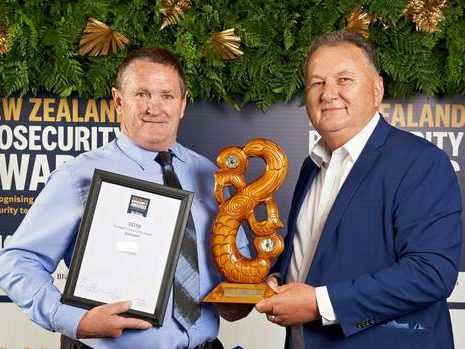Got a freshly dead stoat in your trap? Want to feed your family a tasty meal. No – we’re not offering up stoat recipes here. But the black tip of a stoat’s tail makes a great fishing lure for catching trout and if you’re keen to give a stoat tail fly a go, Taupo’s ‘Didymo Dave’ Cade is just the man to tie it for you.
Trout love the colour and they love the smell of the furry black fishing flies – and they really do stink according to Dave, who has been making them for about 10 years.

“If you put them in a fly box and later open it – whoah!” he says. “The stoat tail flies are well known in Taupo for catching big brown trout at night,” Dave explains. “They’re a streamer fly that you cast out and retrieve back towards you and down on the riverbed they look like a cockabully – a nice big feed – to the trout.”
“In the beginning, I got a couple of tails, fiddled around and came up with a pattern,” says Dave. “Then I started to market them as ‘Didymo Dave’s stoat tail flies to catch trout’. It’s a battle to get enough tails though – especially in summer. You have about 36-48 hours to get to the tail before it gets manky and the hair falls out.”
Another challenge for Dave is to find people who are prepared to cut the tails off dead stoats and send them to him.
“Depending on the size of the tail, I tie them up on a No. 2, 4 or 6 hook. They’re tied on different bodies and I sell them for $5 each and donate the proceeds back to the trapping projects to buy more eggs or other baits for their stoat traps,” Dave explains. “I donate the hook, material and my time.”
Over the last 10 years, Dave reckons he’s raised well over $2000 for stoat-trapping projects.

“It also helps raise awareness of what’s out there,” he says. “A lot of New Zealanders can’t tell the difference between the three mustelids.”
(The black tip of their tails if what distinguishes stoats from the larger ferrets and smaller weasels.)
‘Didymo Dave’ got his title for his enthusiastic championing of New Zealand’s waterways, promoting the ‘Check, Clean, Dry’ campaign to fight the spread of didymo freshwater algae (also known as ‘rock snot’).
“I’m known for pushing boundaries,” he admits. “I was one of about 4 people in New Zealand who really believed we could stop didymo getting to the North Island. I got christened at a meeting when I wasn’t there and ‘Didymo Dave’ stuck like glue. Then I realised it had a power for marketing – so I milked it.”
His passion for defeating didymo earned Dave his nickname, but he’s also a strong advocate and big supporter of land-based conservation efforts.
“About 2005 I was fishing on the Hinemaiaia Stream near Taupo in the dark. When it got light, I went to get lunch and half of it was gone,” he says. “I blamed my sons, but a couple of days later it happened again.”
This time Dave had checked his lunch was intact before leaving home – his sons were off the hook.
“The sandwiches were gnawed!” Dave says. “I was 45 at the time and that was when I found out there were vermin in New Zealand! So I set a trap by the stream and kept getting rats. Now I’ve got 170 traps up the Hinemaiaia Stream and a couple of ladies help me check them.”
“I’ve been fishing the river since 1974 and in all that time I’ve only seen 1 live rat – but I’ve trapped 1500 of them! It’s the nocturnal effect – you just don’t know what’s there!” he says.

In November last year Dave received the Minister’s Biosecurity Award which recognises an individual, group or organisation that has at least 10 years of continuous outstanding contribution to biosecurity in New Zealand.
“David is a very worthy winner of this award – he has led from the grass roots,” said Biosecurity Minister, Damien O’Connor. “He’s widely known for being a passionate and long-standing champion and volunteer for freshwater biosecurity, pest control and conservation. David truly illustrates the impact a passionate person can have in making a difference for biosecurity in New Zealand.”
And he makes great trout fishing flies too…
If any trappers want to help Dave out with stoat tails, Dave says the most important thing is that they are wrapped in paper or frozen from the start. “Wrapped in plastic they sweat and the fur falls out,” he says.
You can contact Dave Cade (aka ‘Didymo Dave’) on 027 240 9603 or check out his Facebook page.

